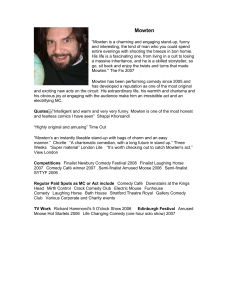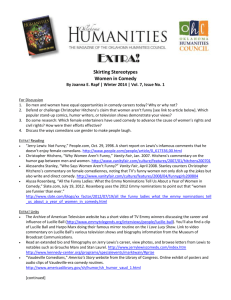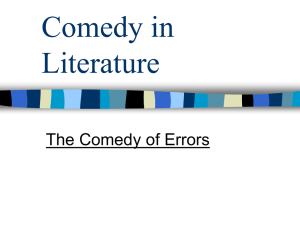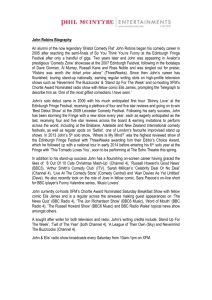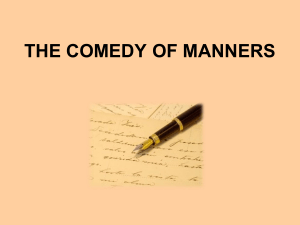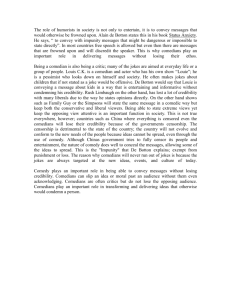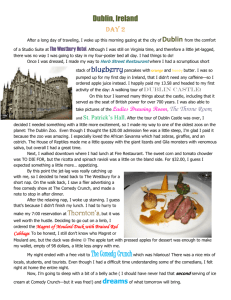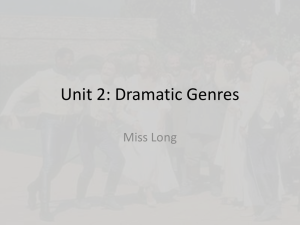Read More - The British Sociological Association
advertisement
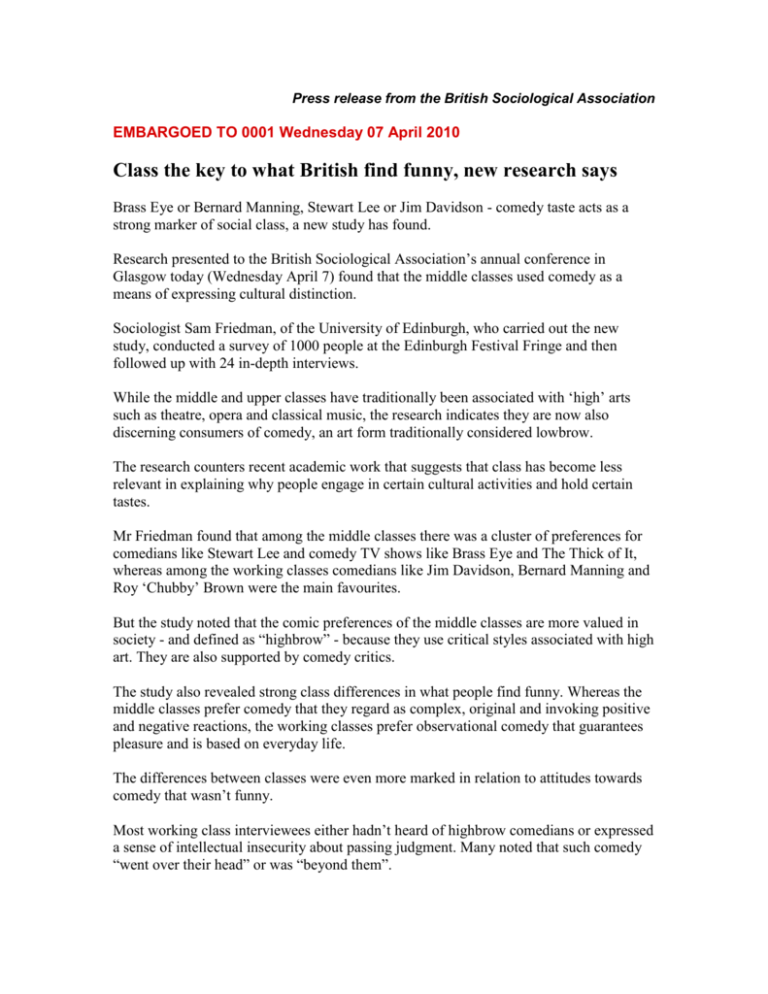
Press release from the British Sociological Association EMBARGOED TO 0001 Wednesday 07 April 2010 Class the key to what British find funny, new research says Brass Eye or Bernard Manning, Stewart Lee or Jim Davidson - comedy taste acts as a strong marker of social class, a new study has found. Research presented to the British Sociological Association’s annual conference in Glasgow today (Wednesday April 7) found that the middle classes used comedy as a means of expressing cultural distinction. Sociologist Sam Friedman, of the University of Edinburgh, who carried out the new study, conducted a survey of 1000 people at the Edinburgh Festival Fringe and then followed up with 24 in-depth interviews. While the middle and upper classes have traditionally been associated with ‘high’ arts such as theatre, opera and classical music, the research indicates they are now also discerning consumers of comedy, an art form traditionally considered lowbrow. The research counters recent academic work that suggests that class has become less relevant in explaining why people engage in certain cultural activities and hold certain tastes. Mr Friedman found that among the middle classes there was a cluster of preferences for comedians like Stewart Lee and comedy TV shows like Brass Eye and The Thick of It, whereas among the working classes comedians like Jim Davidson, Bernard Manning and Roy ‘Chubby’ Brown were the main favourites. But the study noted that the comic preferences of the middle classes are more valued in society - and defined as “highbrow” - because they use critical styles associated with high art. They are also supported by comedy critics. The study also revealed strong class differences in what people find funny. Whereas the middle classes prefer comedy that they regard as complex, original and invoking positive and negative reactions, the working classes prefer observational comedy that guarantees pleasure and is based on everyday life. The differences between classes were even more marked in relation to attitudes towards comedy that wasn’t funny. Most working class interviewees either hadn’t heard of highbrow comedians or expressed a sense of intellectual insecurity about passing judgment. Many noted that such comedy “went over their head” or was “beyond them”. In contrast, middle class interviewees often expressed vociferous objections to the comedians preferred by the working classes. Mr Friedman found such statements often constituted a form of “veiled snobbery”. Although middle class interviewees would not directly mention these comedians as working class, they often made strong negative judgments about their fans as “ignorant”, “bigoted” or “thick”. The study quotes one interviewee, who says: “All I would need to hear is ‘I went to see Roy Chubby Brown last week, it was magic’ and I would want to glass them. “It’s the absence of sophistication in all of it. I don’t mind the form being ‘trad’ if the words are sophisticated. In the absence of any sophistication, I’m wasting my time.” Mr Friedman’s study found that comedy taste was “used by the middle classes as a means of expressing their cultural superiority”. While they presented their preference for more highbrow forms of comedy as the result of a “natural sophistication”, this style of appreciation was actually the result of their social standing, built up through a privileged family background and elite education. Most middle class interviewees had been introduced to abstract and intellectual forms of art by their parents and this interest had been further developed at school and university. In contrast, such 'cultural capital' was often widely unavailable to working classes, who had received hardly any exposure to highbrow culture in their upbringing and education. “Far from illustrating crumbing class hierarchies, the increasing popularity of comedy among the middle classes simply shows how the privileged are now using their superior cultural skills to distinguish themselves in pop culture as well as the high arts.” The study also revealed that some comedians such as Eddie Izzard and Frank Skinner as well as TV Comedies like Peep Show, Monty Python and Little Britain were widely enjoyed by respondents across the class divide. Mr Friedman’s paper, entitled, “The Cultural Currency of a ‘Good’ Sense of Humour: British Comedy and New Forms of Distinction”, was one of 450 papers presented at the British Sociological Association’s annual conference in Glasgow from April 7-9 Quotes: (From middle class people) Mark: (on Stewart Lee): “To be perfectly honest he makes me feel like I’m in an incrowd of comedy nerds. You need to see the pull back and reveals. (laughs). You’ve got to see him delay the punchline. You have to see him bring about comedy through repetition. He’s got all the tricks there. It is almost like sitting an exam. You go in and you know you’re going to be challenged, you know a few people in the audience won’t get him. Overall it makes you feel a bit smug, and it’s an awful thing to say, but it makes you look down on the people who don’t get him.” Brian: (on laughter): “I don’t think laughter is integral. It’s really irrelevant for me personally. I know a lot of friends who go to a lot of comedy gigs that they say they don’t really laugh at all. I mean they’ll say that comedian was really funny but I suppose you’re taking in the artistic value rather than just purely making you laugh.” Louise (on The Thick Of It): “If there’s one thing about it that’s brilliant it’s the use of language. It’s awesome. The language is just intoxifying. Peter Capaldi, on a swearathon, it’s something to behold, it’s close to Poetry, it’s just fantastic. These huge monologues, rhapsodies (laughs) of horrible words, it just makes the half hour fly by.” (From Working Class People) Karen: “My take on comedy is that it’s got to make me laugh, it doesn’t mean to say I need to think about it, except for that split-second in the punchline. I’m not looking for them to educate me.” Pete (on liking pleasurable comedy): “To be honest with you I see enough shit in the newspapers and the news every day, I’d rather see things that make me laugh, that I get enjoyment out of. I don’t want to see anything too highbrow or too morose. I just want to be entertained in a light hearted way.” Lee (on not ‘getting’ highbrow comedy): “If someone was to do stand-up about key figures in WW2, it would go over my head. It would be everyone laughing and me going…‘ok’. I was once in a show called Rosencrantz and Guildenstern Are Dead. And I learnt the lines and delivered the lines just like the director told me. And it wasn’t until the show night when people were laughing that I knew which bits were funny because unfortunately it was beyond me. I didn’t have that education.” For more information, please contact: Tony Trueman British Sociological Association Tel: 07964 023392 Notes: 1. The British Sociological Association’s mission is to represent the intellectual and sociological interests of its members. The BSA is a Company Limited by Guarantee. Registered in England and Wales. Company Number: 3890729. Registered Charity Number 1080235
